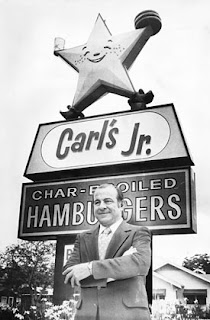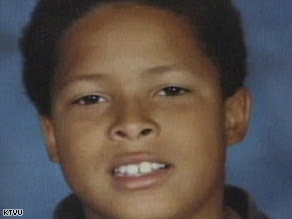 Anyone who’s driven through southern California knows the familiar bright signs of Carl’s Jr. Hamburgers. They’re almost as ubiquitous as McDonald’s. But word came today that the founder of that fast food empire — a devout Catholic, to boot — has died.
Anyone who’s driven through southern California knows the familiar bright signs of Carl’s Jr. Hamburgers. They’re almost as ubiquitous as McDonald’s. But word came today that the founder of that fast food empire — a devout Catholic, to boot — has died.
The LA Times reports:
Carl Karcher, who parlayed a single hot dog pushcart into a chain of more than 1,000 fast-food restaurants bearing his name, died Friday. He was 90.
The affable, burly entrepreneur, known to millions as the jovial television pitchman for the Carl’s Jr. chain, died of complications from Parkinson’s-related pneumonia at St. Jude Medical Center in Fullerton, according to Beth Mansfield, a spokeswoman for parent company CKE Restaurants.
A stalwart Orange County Republican, Karcher worked tirelessly for the party and its candidates, still finding time for active and enthusiastic involvement in local causes, including United Way of Orange County, Orangewood Children’s Home, the Roman Catholic Knights of Malta, Right to Life League and South Coast Repertory.
The paneled library of his 6,500-square-foot home in Anaheim was adorned with photos of Karcher with the famous, powerful and influential, including Presidents Reagan and Nixon, Soviet President Mikhail Gorbachev, entertainer Bob Hope and Pope John Paul II.
But his support of deeply conservative politicians such as Orange County’s John Schmitz, his opposition to abortion and his endorsement of failed legislation that would have permitted schools to fire homosexual teachers earned Karcher the enmity of liberal, gay and women’s rights groups.
By the late 1980s, insider-trading allegations against Karcher and his family led to a $664,000 settlement. And by the 1990s, ill-advised personal investments and the plummeting price of Carl’s Jr. stock pushed him to the edge of bankruptcy and into a losing battle with the company’s board of directors that reduced his role to largely ceremonial duties.
Although the company stock rose, it fell again, and Karcher never regained the power and success that once had made him one of Southern California’s most recognized businessmen, with a personal worth said to have peaked at more than $100 million.
Born Jan. 16, 1917, in Upper Sandusky, Ohio, to Leo and Anna Karcher, Carl Nicholas Karcher dropped out of school after the eighth grade to work on his parents’ 300-acre farm.
It was the era of the Great Depression, and prospects for farmhands looked pretty bleak. When an uncle, Ben Karcher, offered him a job at the uncle’s feed store in Anaheim at $18 a week, the strapping 20-year-old jumped at the chance.
“You didn’t say in those days, ‘Is that all you can pay me?’ ” Karcher told some college students years later, according to published reports. “You say, ‘Thank you very much, Uncle Ben.’ “
After moving to Southern California, Karcher attended St. Boniface Catholic Church in Anaheim, where he met Margaret Heinz, the daughter of a local orange grower.
Karcher, who had gotten a new job wrapping and delivering bread for a local bakery, married her in 1939. Over their more than 66 years of marriage, they would have 12 children. Margaret died of liver cancer in June 2006.
In 1941, Karcher borrowed $311 against his new Plymouth sedan, kicked in $15 of his own and bought a hot dog cart, which he set up at Florence and Central avenues in South-Central Los Angeles, across from the old Goodyear plant. According to the Orange County Business Journal, sales that first day totaled $14.75.
Business picked up, and, within months, Karcher owned several other hot dog carts. After a stint in the Army during World War II, he returned to Southern California in 1945 and opened his first full-service restaurant, called Carl’s Drive-In Barbeque, in Anaheim. In 1956, he opened two more restaurants, one in Brea and the other in Anaheim. Smaller versions of the first restaurant, they were called Carl’s Jr.
Customers liked the clean, brightly decorated restaurants and quickly got used to the idea of paying when they ordered, then waiting to be served. They liked the cheerful, blustery boss and his hamburgers. And they liked the smiling star that became the Carl’s Jr. logo.
By the late 1950s, there were four Carl’s Jr. restaurants in Southern California. By 1966, the year Karcher incorporated as Carl Karcher Enterprises, there were 24. By 1975, there were 100.
Karcher worked hard, rising every morning at 5 and attending Mass at St. Boniface before arriving at the company headquarters in Anaheim about 7 a.m.
The boss ate several meals a week at his restaurants, and, wherever he went, he handed out coupons for free hamburgers, wrapped in a Scripture verse. Despite 50- to 80-hour workweeks and a firm commitment to his family, he still found time most evenings to attend a civic, charity or political event. But politics sometimes got him into trouble.
In 1972, he alienated moderates by serving as chairman of the committee to reelect the ultraconservative Schmitz to Congress. Of Wisconsin Sen. Joe McCarthy, castigated for his virulent anti-communist crusades in the 1950s, Karcher said, “I think some of his points were valid.” And Karcher said he thought Nixon got a “bum rap” in the Watergate scandal.
Over the years, Carl’s Jr. restaurants became a favorite target of protesting feminist and gay rights groups. The feminists didn’t like his donations to anti-abortion organizations. Opposition from gays stemmed from his support in 1978 of Proposition 6, a failed initiative that would have allowed schools to fire teachers or other employees who practice or advocate homosexuality.
There’s more about Carl Karcher’s colorful life at the LA Times link.

